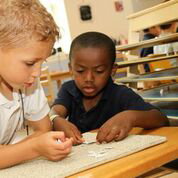Montessori as a Family Intervention
 Located in suburban Washington, DC, Crossway began in 1992 as an intervention for single mothers and their very young children. A unique blend of housing and education, the Crossway “campus” is a former elementary school that is now home to 46 families, a school, and community center.
Located in suburban Washington, DC, Crossway began in 1992 as an intervention for single mothers and their very young children. A unique blend of housing and education, the Crossway “campus” is a former elementary school that is now home to 46 families, a school, and community center.
“What we’re really implementing here” explains founder and Executive Director Kathleen Guinan, “is an asset-based, family support model.” Initially, childcare was a minor player in the model; a necessary “service” to enable the mothers to engage in educational and therapeutic activities. Montessori arrived several years into the initiative, when Guinan hired Ann Byrne, a Montessori trained educator with extensive experience managing pre-school and childcare operations near the Capitol.
“We were running a well-regarded pre-school model,” explains Guinan. “And it was chaotic; children crying, acting out, adults trying to control them.” Byrne convinced Guinan to try Montessori in one of the classrooms. “In the less than a month, it was totally different story.” Children learned to concentrate, and therefore redirected their energy to “work.” “Everything calmed down,” Guinan notes. Just as important, the mothers noticed the change in their children, and began to pay closer attention to what was going on in those classrooms. Once Guinan witnessed the impact of Montessori learning, she quickly embraced its theory and practice as a driver for the entire organization.
The women who come to Crossway represent vastly different social and economic circumstances, but all have encountered challenges that have left them vulnerable. Crossway’s aim is to assist these women in transforming their lives. In many cases, that means breaking generational cycles of poverty, substance abuse, violence, and familial dysfunction. Transformation, according to Guinan, starts with fundamentally understanding the family as a system. “Children are always connected to their families; to attempt to see them as separate is a mistake.”
Crossway’s operating vision is extraordinarily ambitious. Catalyzing change from the inside out – Montessori theory and practice infuse every aspect of the organization – from the design and maintenance of the campus to an emphatic focus on practical life to an integrated vision of work as the path to lasting prosperity.
Blending housing, early education, and comprehensive family supports (including wellness, life skills, and workforce training), Crossway measures its success on outcomes for both mothers and children. After three years of residence at Crossway, 85% of mothers retain employment, maintain households without public assistance, and report no issues with substance abuse.
Visit Crossway Montessori Communities online.